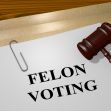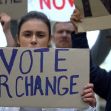Writing that the right to vote in Florida is “under siege,” a federal judge struck parts of the state’s “unconstitutional” and “suppressive” new voting law. In addition, he took the rare step of ordering mandatory pre-clearance, an “extraordinary oversight” that will be required for new Florida laws that seek to regulate the right to vote for the next ten years.
In what the media has called a “stinging” and “blistering,” opinion, in a 288-page ruling on March 22, United States District Court Judge Mark Walker, in the Tallahassee Division of the Northern District of Florida, took issue with the outcome of a non-jury, bench trial and enjoined most of the provisions in Florida’s SB 90 that plaintiffs said were “internationally targeting minority voters.”
Headed by the League of Women Voters, a group of organizations including the Florida NAACP challenged SB90 under the First, Fourteenth, and Fifteenth Amendments, the Americans with Disabilities Act (ADA), and the Voting Rights Act (VRA). SB 90, which passed in 2021, instituted 33 new provisions to the Florida election code that plaintiffs claimed discriminated against Black and Latino voters and disabled voters.
These provisions included new requirements for vote-by-mail, confirmation of signatures, more identification of voters, as well as lengthening time periods for voter tabulation; significantly limiting the availability of drop boxes, and regulating poll watchers, among others.
Walker’s opinion began with a simple premise: “This case is about our sacred right to vote—won at great cost in blood and treasure,” he said while adding a footnote that compared the Florida case to current events in Ukraine that are “poignant reminders of both the value and fragility of democracy.” He then enjoined Florida from enforcing “most of the law’s challenged provisions.”
He quickly acknowledged that parts of the Voting Rights Act of 1965, which outlawed discriminatory voting practices, are currently “under siege.” He clarified the right of the state governments to regulate their elections but cautioned that they can only do so if the state complies with acts of Congress as well as the U.S Constitution.
After citing several cases in which Florida laws were allowed to stand, he commented, “Sometimes, Florida law goes too far,” while perhaps signaling to higher courts that the question before them would be “not whether this Court thinks those laws are good policy; the question is whether they violate federal law.”
The ruling first analyzed SB 90’s compliance with the VRA. Supporters of the bill, signed by Gov. Ron DeSantis live on Fox News in May, argued that it was enacted to “instill . . . voter confidence by ensuring election integrity and security.”
First, SB 90 changed many of Florida’s voting practices. The time for valid registration was changed from four years to two years. Potential voters must show their drivers’ licenses, Florida identification number, or the last four digits of their Social Security number—all of which must be confirmed by a supervisor. Proof of registration must be delivered by non-profit organizations to designated Florida government officials within 14 days. And, drop boxes must be “continuously monitored by a supervisor” and carry a $25,000 fine if used outside authorized hours.
Next came the new provision that has probably received the most attention from the media. SB 90 prohibits all activities which “attempt to influence voters,” including the “non-partisan provision of aid to voters waiting in line to vote, such as giving out water, fans, snacks, chairs, ponchos, and umbrellas.” Needless to say, it is hot in Florida and dehydration can occur if voters are required to stand in Florida’s lines that are “longer than much of the country,” according to expert testimony.
Walker then turned to the question of standing and concluded that several of the nonprofit plaintiffs have the right to challenge the Florida law. He next reviewed claims that SB90 demonstrates intentional discrimination even though it “appears racially neutral on its face.” After a close examination, he concluded that plentiful circumstantial evidence showed that there was “intent to discriminate against Black voters, but that Plaintiffs have not met their burden to show that the Legislature intended to discriminate against Latino voters.” There was, for example, no evidence that showed Latinos would suffer from changes in laws that govern drop boxes.
He explained that plaintiffs had to look at “the totality of the facts” to see whether race was a motivating factor in SB 90’s adoption. He examined the historical background of the law while reviewing Florida’s “grotesque history of racial discrimination” that began right after the Civil War when Black males were denied the franchise by both governmental restriction and “terrorism,” such as lynching. Latinos, too, were discriminated against by language barriers and other “racially polarized voting environments.”
The past, Walker said, “remains relevant.” As does the present, as shown by expert testimony about demographics. Most striking are disclosures that Black and Latino voters are “concentrated” in only 12 of Florida’s 67 counties. In addition, evidence showed that nearly 80% of Black voters are Democrats, while just under 50% of white voters are Republicans, and Latino voters are more “evenly split.”
Judge Walker said that these numbers led to Florida’s history of “targeting Black voters because of their affiliation with the Democratic party.” Florida has repeatedly purged or sought to purge its voter rolls, he said. “These purges and attempted purges have consistently and disproportionately affected, or threatened to affect, Black voters.” For example, he said Black voters were ten times more likely to have their ballots rejected than white voters.
He also discussed the significantly higher rates by which Blacks take advantage of early voting and voting by mail (VBM). The judge detailed recent attempts to change the calendar to eliminate Sunday voting. Black churches have been shown to increase the Sunday votes of their congregants.
After outlining all these discriminatory provisions, Walker said, “Once is an accident, twice is a coincidence, three times is a pattern.” He said that Florida has a “toxic mixture of racially polarized voting” and stated that the 2020 election led to the passage of SB 90 when legislators learned that VBM was now vastly favored by about 40% of Black voters. One expert said that Blacks would continue to VBM because they have discovered how convenient it is. Blacks would also be harmed by changes in the law that require re-registration every two, rather than every four years.
He concluded that these outcomes were both foreseeable and sought out by Florida’s legislators who had plenty of demographic and other data that would predict these results. There were plenty of less discriminatory alternatives available as well to advance the legislators’ stated goals of reducing fraud and instilling voter confidence.
Following an extensive review of what he now classified as laws that discriminate against Blacks, Latinos and the disabled, he granted the permanent injunction and went on to create a requirement for the pre-clearance of future election laws by federal courts prior to their enactment. He said Congress created pre-clearance to “provide for judicial scrutiny of new or changed voting requirements, [and] to insure against the erection of new and onerous discriminatory voting barriers by State or political subdivisions which had been found to have discriminated.”
“Florida has repeatedly, recently, and persistently acted to deny Black Floridians access to the franchise,” Walker wrote, and “preclearance would prevent future violations.” He continued, “Without preclearance, Florida can pass unconstitutional restrictions…with impunity.” He emphasized that “Congress gets the final rule.”
At least until the Supreme Court weighs in if Walker’s injunction is challenged. And DeSantis told a news conference that “It’s just a matter of how quickly it’s going to get reversed.”






